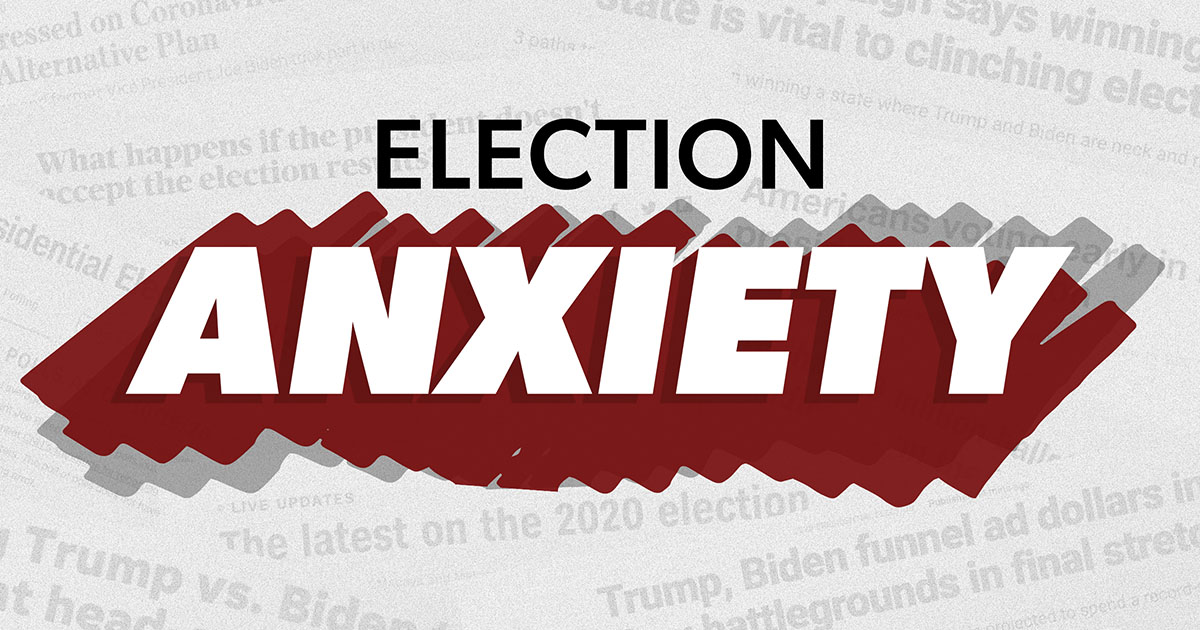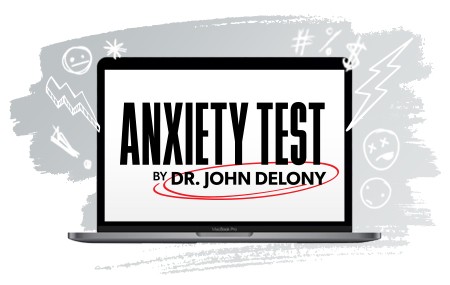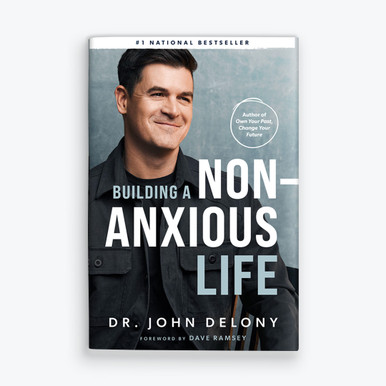How to Deal With Election Anxiety: 8 Tips to Keep Your Cool
8 Min Read | Jul 25, 2024

Every four years, citizens across our country head to the polls to choose the next president of the United States. Together, we make a critical decision about the future of our country. And after months of ruthless banter, an onslaught of toxic social media, and deafening political commentary, we stand in line, wait our turn, and do our part.
If you’re feeling amped and anxious about this year’s political season, you’re not the only one. In fact, 73% of U.S. adults reported being particularly anxious about the 2024 election—and that’s on top of other world events and stressors of everyday life.1
But good folks, November 5 will come and go just like it has every other year. And regardless of what happens, the world will keep spinning. Don’t let anxiety and your fear of the unknown steal your joy, your peace of mind, or your courage to act during this season. Here are a few ways to deal with election anxiety as we approach the big day.
8 Ways to Deal With Election Anxiety
If you’re like me, you might be feeling on edge about the outcome. Elections create anxiety and make us feel small because they remind us of an important truth: We control basically nothing. Voting feels like going to the state fair and playing a carnival game where you throw Ping-Pong balls into fishbowls and try to win a prize—but you only get one Ping-Pong ball and one throw. That’s it. You let go and hope to get the outcome you want.
We’re all feeling it, so here are eight ways to stop worrying about politics and reduce your election anxiety:
1. Turn off the news (and limit your social media).
By now, you know who you’re voting for (and by the way—most everyone around you does too, so there’s no need to keep arguing and adding to the noise). You don’t have to keep flooding your brain with the latest arguments and opinions and predictions. Just put down the phone. Protect yourself by setting boundaries for when and how often you’ll access media of any kind.
Have you heard the term doomscrolling? It’s the habit of mindlessly scrolling through the latest videos, articles and tweets, searching for the next shocking headline. We’ve all been there—it feels like spinning on a hamster wheel of death and destruction. And that’s not much of an exaggeration because a steady diet of catastrophic news—especially when you can’t do much about it—is bad for your health. Information that creates fear, panic and stress triggers a complex physiological reaction. Your heart rate and blood pressure spike, and stress hormones flood your body. It’s hard to sleep, to focus, to rest, and to breathe. Your devices have off buttons. Use them.
2. Get involved with local politics.
Very few of us will ever make a big splash in Washington, D.C., but you can make a difference in your neighborhood, your town and your state. In fact, you can make more of an impact on this level than you realize. Decisive action helps reduce anxiety because it empowers you to focus on what you can control.
Read up on your local candidates. Learn what they stand for and talk to people in your community about them. Who are the judges, representatives, senators, school board members and city commissioners on your ballot? Their time in office will have a direct impact on your streets, on your kids’ classrooms, and on how local businesses are run.
3. Set an example for those around you.
Your example can be a tremendous force for good.
You don’t have to hold political office to model what it means to be a good citizen. For real, we need good citizens! Whether we realize it or not, our families, coworkers, internet friends and real friends are watching the examples we set. They’re paying attention to our bickering, our complaining and our mindless fixation on our screens—as well as our patience, service and generosity.
Being a good citizen looks like getting intentional about kindness: Tip your waiter or waitress obnoxiously. Be grateful with customer service people. Let folks over in traffic. If you are in a season of blessing, pick up the cost of someone’s groceries behind you in line.
Specific to the election, I’m taking my son with me when I vote. I want him to stand in that line with me. He’s 14—and it’s important to me that he has memories seared in his heart and mind about how important this is for his dad and for our country.
Free Anxiety Test
This test will help you get clarity on the situations that could be contributing to your feelings of stress, anxiety and burnout.
4. Make time for rest, kindness and play.
Seasons of political stress call for a whole lot of rest and play. Make time to just be a human being. Laugh. Plan a super hot surprise date for your spouse. Get your friends together to kick a soccer ball around. Take your family on a walk around the neighborhood and wave at people in crosswalks.
Let’s choose to be kind over the next few weeks and months. We are better than stooping to our worst, crazed behavior. Change starts when individuals choose to regain their humanity by simply acting like human beings. So go first.
5. Connect with others and value your community.
I want you to think of valuing your community in two ways. First, when you’re feeling anxious, it’s a sign that you’re feeling disconnected. Spend time with those who support and love you—your spouse, your children and your friends. Talk about your fears and political anxiety and listen to the fears of others. Seek to listen first and explain second.
And next, I want you to value people who don’t align with you politically. No matter who wins, we’re going to pump gas next to each other at the same stations. We’re going to wait in the same carpool lines to get our kids from school. We’re going to share meals next to each other at restaurants. Let’s be with one another as human beings and choose not to go on the offensive. We must choose to move forward, united as one group of people doing the best we can. We need each other.
6. Use your right to vote.
You must vote. Voting is your opportunity to let your voice be heard. It’s your responsibility to participate in making this country a better place—for yourself, your family and your neighbors. Take ownership of your life and your future by casting your ballot.
Voting is one of our sacred rights as citizens of this country. Even if our democracy is flawed at times (and it is), we get to carry on a legacy that was hard-won by generations of courageous men and women before us. This year, like every election before, you get a chance to make your voice heard. Embrace that opportunity with dignity.
Decision made: We’re all going to vote.
7. Control what you can control.
Anxiety is an alarm system that warns us of danger in our environment. And your alarms may have been ringing at full blast for a long time. But experiencing anxiety doesn’t mean that you’re broken or weak: It means you feel disconnected, unsafe or out of control. Anxiety isn’t a one-and-done thing. For some of us, it will take a lifetime to change our relationship with anxiety.
But there are actions you can take today to find your center in the storm. Start small with healthy actions like prioritizing your sleep, eating healthy meals, spending time in the sun, and being with people you care about. I know it sounds too simple to make a difference, but without this foundation in place, your mind will more easily wander to the doom and gloom of the news cycle.
8. Have productive conversations in person.
Politics are meant to be relational. Therefore, conversations about politics are almost always better had in person.
It’s super easy to log on to Instagram or hit the comments section on YouTube and unleash your opinions without consequence. But what good does that serve, really? Rather than taking out your frustrations or airing your grievances online, learn how to have productive conversations with those around you. If you feel triggered by the news or your neighbor’s election sign in his front yard, I want you to challenge your automatic reactions.
Instead, practice listening to others with different opinions. Practice sharing your opinion if you’re asked, and keeping the conversation focused on hope and policy, not anger and division.
Stay Well No Matter What Happens in Politics
Here’s what I want you to remember. At the end of the day, after you cast your vote, you can’t control what happens in the White House. Only you can control how well you take care of yourself and your family, how you budget, how you spend your time, and how you treat others. So try to focus less on the politicians on stage and spend more time and energy focusing on what you can do in your own home, church and community.
For more helpful tips about feeling more peace in your life, check out my new book, Building a Non-Anxious Life. In the book, you’ll discover how to intentionally live out Six Daily Choices to create a non-anxious life.



